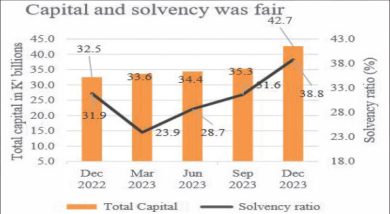Monsanto tips farmers on commercial farming
 Multinational agricultural biotechnology corporation Monsanto has joined calls for farmers to seriously engage in commercial farming if they are to alleviate their poverty.
Multinational agricultural biotechnology corporation Monsanto has joined calls for farmers to seriously engage in commercial farming if they are to alleviate their poverty.
The call by Monsanto through their local office in Malawi comes against the backdrop of Farmers Union of Malawi (FUM) encouraging farmers to consider commercial farming to boost agricultural productivity and socio-economic development.
Monsanto Malawi sales and marketing manager Denis Kachikho said they have engaged an extra gear to work with farmers on how they can enhance commercial farming.
“We make sure that we make our seeds available to farmers even after the normal agriculture season is over. In our interaction with farmers, we also tell them to consider agriculture as a business,” said Kachikho, on the sidelines of a field day in Zomba.
For some time, Malawi has had two agricultural systems. One for commercial farmers mainly in tobacco, tea, sugar, coffee and other plantation crops and the other for subsistence farming.
Malawi’s agricultural sector has primarily been dominated by subsistence farming mainly for food security at household level in which the excess is sold.
Major crops in this sector are maize, cotton, groundnuts, beans with 80 percent of the country’s food basket produced by smallholders.
Malawi is an agro-based economy with more than 30 percent of its Gross Domestic Product (GDP)—the broadest measure of the economy’s output—coming from the sector.
Kachikho said it has always been the policy of his company to ensure that farmers’ ability to engage in commercial farming is enhanced.
“We supply our seeds to NGOs [non-governmental organisations] and large estates for them to extensively engage in commercial farming. This is, most of the times, done as part of winter cropping to ensure that food security is enhanced,” he said.
So far, he said, the company has distributed 10 tonnes of seeds particularly in the Shire Valley districts of Nsanje and Chikhwawa to plant in the winter.
He observed that since the two districts are affected by drought year in year out, winter cropping is ideal.
FUM president Felix Jumbe in an interview said there is need to ensure that commercial credit is directed towards commercial farmers as was the case some time back.
He, however, said the genesis of the downfall of commercial farming started in 1992/93 when Malawi had a drought which resulted in smallholder farmers being unable to pay back loans.
After this, Jumbe said, food insecurity reigned over Malawi all the way from the mid 1990s to 2004 when the situation was rescued by the subsidy project.
“Agriculture productivity has gone down over the years reducing the country’s exports on groundnuts, rice, soya, and many other crops. Due to a lack of regulatory framework and legislation to protect farmers from exploitation, farmers have been on the losing side discouraging them from investing in agriculture production,” he explained.
Commercial banks also stopped lending to farmers and started calling farmers a risky group, said Jumbe, stressing that reduced exports over the years has resulted in the kwacha losing value to the US dollar.
Figures indicate that reduced financing to agriculture, now at five percent of GDP, has made many commercial farmers to close their farms.




